
By:
- Jade Griffin
Published Date
By:
- Jade Griffin
Share This:
Personalized Medicine, Climate Change Topics of TED-Style Founders Symposium
Curiosity, passion and transformation—the themes for this year’s annual Founders Celebration Nov. 13-15—have all come together to make UC San Diego one of the top 15 research universities in the world. But what innovative research is driving these accolades? As UC San Diego defines the future of a public research university, what’s next for the campus?
The 5th annual Founders Symposium will kick off Founders Celebration this year and showcase how research happening at UC San Diego is translating into real-world benefits. As part of the symposium, six faculty members will present short, engaging TED-style talks on the impacts of their research at 5 p.m. on Thursday, Nov. 13 in Price Center East.
“As we celebrate UC San Diego’s anniversary, and the visionaries who have made the campus a world leader, Founders Symposium offers an intriguing glimpse into the transformative research that is benefiting our planet and global society, and future generations to come,” said Chancellor Pradeep K. Khosla.
With new and fresh topics, Founders Symposium will illuminate the collaborative approach used to understand and address complex issues in two broadly focused areas of research and discovery: enriching human life and society, and understanding and protecting the planet.
The evening will begin at 4 p.m. with a reception at The Loft with undergraduate social innovators who are addressing issues such as poverty, health, education and the environment. The symposium will follow at 5 p.m., in the Price Center East Ballroom, featuring a series of three 10-minute presentations on how UC San Diego research is enriching human life and society, followed by another thematic grouping of 10-12 minute talks on understanding and protecting the planet. The program will be followed by a question and answer session moderated by UC San Diego alumna Lauren Reynolds.
Following are the speakers, their talk titles and their responses to what drives their curiosity and passion to transform the world.
Understanding and Protecting the Planet
The first series of brief, dynamic discussions will focus on research relating to climate change, and how it is leading to a better understanding of the planet, in order to protect its future.
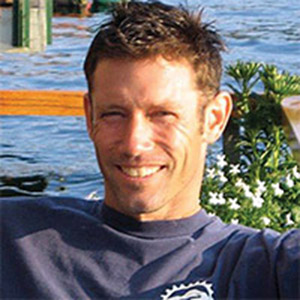
Matthew Alford, Ph.D. ’98, Professor, Scripps Institution of Oceanography
Chasing Waves: Measuring Skyscraper-High Waves Beneath the Sea and Their Importance for Submarines, Coastal Ecosystems and Climate
What initially sparked your curiosity about this area of study?
I still remember being fascinated the first time I ever saw the signatures of undersea waves on a computer screen at Scripps when I was a prospective student. I think that the concept of skyscraper-sized waves that have to do with the Earth’s life and climate is amazing and intriguing.
Day-to-day, what fuels your passion for you research?
As a surfer, I love the analogy between the waves we see on our beaches, which also break and come from far away, to the undersea waves which also have these characteristics.
What potential impact—or transformation—do you see coming from this research?
Understanding these waves and their effects on the climate will improve our understanding of the many feedbacks that exist in the ocean/atmosphere system. We are only beginning to understand their effect on life in the coastal sea.
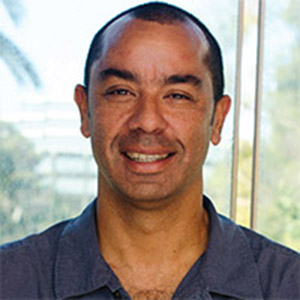
Eugene Pawlak, Ph.D., ’97, Associate Professor, Department of Mechanical and Aerospace Engineering
Turbulence: Chicken Soup for the Coral-Reef Soul
What initially sparked your curiosity about this area of study?
I grew up along the coast in Panama and have lived near the ocean and have surfed most of my life - so I’ve experienced first-hand the dramatic changes in the ocean that can occur due to storms, swell, pollution, etc. The Pacific coast of Panama sees tidal changes of 20 feet so you can see remarkable changes over six hours. I was also a sand-castle builder as a kid (and still am!) and so I was fascinated by the changes that came about due to waves and tides at an early age.
Day-to-day, what fuels your passion for you research?
On a very basic level, I think I’m passionate about understanding how things work. At a broader level, I’ve become more interested in applying this understanding to environmental problems, for example, making use of our knowledge of physical systems in understanding responses of biological and chemical systems in reef environments.
What potential impact—or transformation—do you see coming from this research?
My research is fundamentally about understanding physical dynamics of environmental systems, focused on connections between the coast and the open ocean. From an engineering perspective, this research has implications for predicting storm surge, tsunami inundation, water quality and coastal erosion. I believe the potential for transformative impacts arises from working across disciplines.
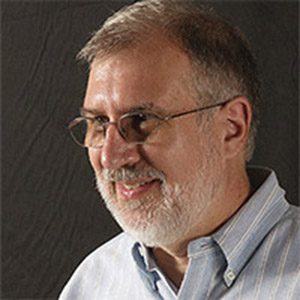
Richard Carson, Ph.D., Professor, Department of Economics
China: Consumption, CO2, and Climate Change
What initially sparked your curiosity about this area of study?
I became interested in working on climate change back in the 1990's when I was research director for International Environmental Policy at the University of California's system-wide Institute on Global Conflict and Cooperation (IGCC), which is housed here on campus at the Graduate School of International Relations and Pacific Studies (IR/PS). IGCC became an accredited NGO at the United Nation's climate negotiations and I took a delegation of experts there to give talks on the underlying science and policy issues. Susan Shirk at IR/PS, who is one of the world's foremost experts on China, encouraged me to look at what was happening in China with respect to energy and environmental policies.
Day-to-day, what fuels your passion for your research?
Good research is a lot like good detective work. It requires looking at an issue from different perspectives and following your intuition along those paths. A lot of those paths will not end up leading to the right direction, but you will understand the problem better. If you are persistent, you can learn a lot. What makes you persistent is the hope that your work will make the world a better place.
What potential impact—or transformation—do you see coming from this research?
My earlier work on China had a lot of influence because it showed China's carbon dioxide emissions were growing and would continue to grow at much faster rate than experts earlier thought. I am hopeful the new project that I am working on with Mark Jacobsen, a professor in the Economics department, and Anthony Liu, a former graduate student here who is now a fellow at Resources for the Future, will point the way toward how China and other developing countries can effectively put a price on carbon emissions that will simultaneously bring down those emissions and cause faster growth—not slower, as political leaders fear.
Enriching Human Life and Society
The second round of TED-style talks will highlight different aspects of research relating to personalized medicine, which is at the forefront of medical advancement for the benefit of health and human life.
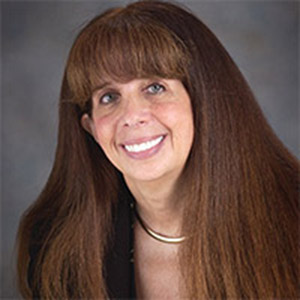
Razelle Kurzrock, M.D., Professor and Division Chief, Division of Hematology-Oncology, Senior Deputy Center Director for Clinical Science
Personalized Cancer Therapy: Promise and Challenge
What initially sparked your curiosity about this area of study?
My interest was sparked by the deep science underlying genomics and the breathtaking advances in the tools available to interrogate tumor molecular profiles.
Day-to-day, what fuels your passion for your research?
My passion is fueled by seeing responses in patients who were previously considered untreatable.
What potential impact—or transformation—do you see coming from this research?
We are at the cutting edge of a transformative change in cancer. We will use genomics and immunotherapy to increase survival in a remarkable way.
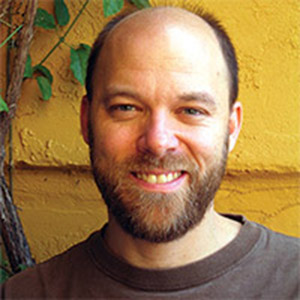
William Griswold, Ph.D., Professor, Department of Computer Science and Engineering
Pervasive Air Quality Monitoring via the Crowd
What initially sparked your curiosity about this area of study?
I learned that there were just a handful of air quality monitoring stations in San Diego, and that we really knew so little about how air quality in the region was affecting the average person. I realized that recent developments in mobile computing technology and sensing devices would enable much more accurate and detailed sensing.
Day-to-day, what fuels your passion for your research?
Three things:
- I believe that with each advance in computing, we get a little closer to achieving our full potential. Computing technology holds the promise to enhance our humanity and our potential as human beings: our creativity, our intelligence, our reach and how we relate to each other.
- Students and their hunger for learning. I want to make their dreams come true.
- The opportunity to make this a better world for everyone.
What potential impact—or transformation—do you see coming from this research?
CitiSense (which leverages smartphones and the advent of cheap, compact sensors to enable real-time monitoring of air quality) is one example of how pervasive data collection and analysis can reveal the state of our world and how it affects our well-being on a daily basis. It's hard to perceive while we're in the middle of it, but a revolution is afoot.
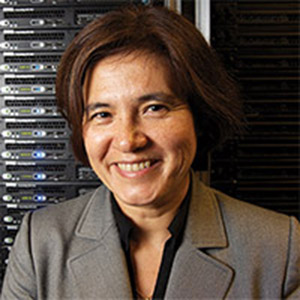
Lucila Ohno-Machado M.D., MBA, Ph.D., Professor and Division Chief, Division of Biomedical Informatics, Associate Dean for Informatics and Technology
Big Data: What It Means to You
What initially sparked your curiosity about this area of study?
Data sharing is important for use to be able to answer real questions from real people, e.g., what would be the best therapy for me? What is my prognosis given Stage II glioma? Have individuals like me been treated with this new therapy? The answers to data sharing involve technical, social, ethical and legal issues. It is an exciting intersection of humanities, science and engineering.
Day-to-day, what fuels your passion for your research?
The potential to answer these questions with the technology we have in place, while at the same time protecting the privacy of individuals and institutions.
What potential impact—or transformation—do you see coming from this research?
Just as today we can find information on the web that was only available in libraries several decades ago, we need to find information about health and disease that is customized to our needs and situation. Creating this environment is a big challenge with huge potential for big payoffs in terms of patient satisfaction and advancing scientific knowledge.
Founders Symposium is free and open to the public. All seating is limited and will be filled on a first-come, first-served basis. Visit founders.ucsd.edu for more details and full faculty biographies.
In addition, concurrent with Founders Celebration, the Academic Senate recognizes two faculty members whose research has made a significant contribution to the advancement of knowledge. John Wixted, of the department of psychology presented on Nov. 3, and Kim Prather, of the department of chemistry and biochemistry and Scripps Oceanography will present on Nov. 12 at 3 p.m. in the Faculty Club. Visit founders.ucsd.edu for more information.
Share This:
You May Also Like
Stay in the Know
Keep up with all the latest from UC San Diego. Subscribe to the newsletter today.


